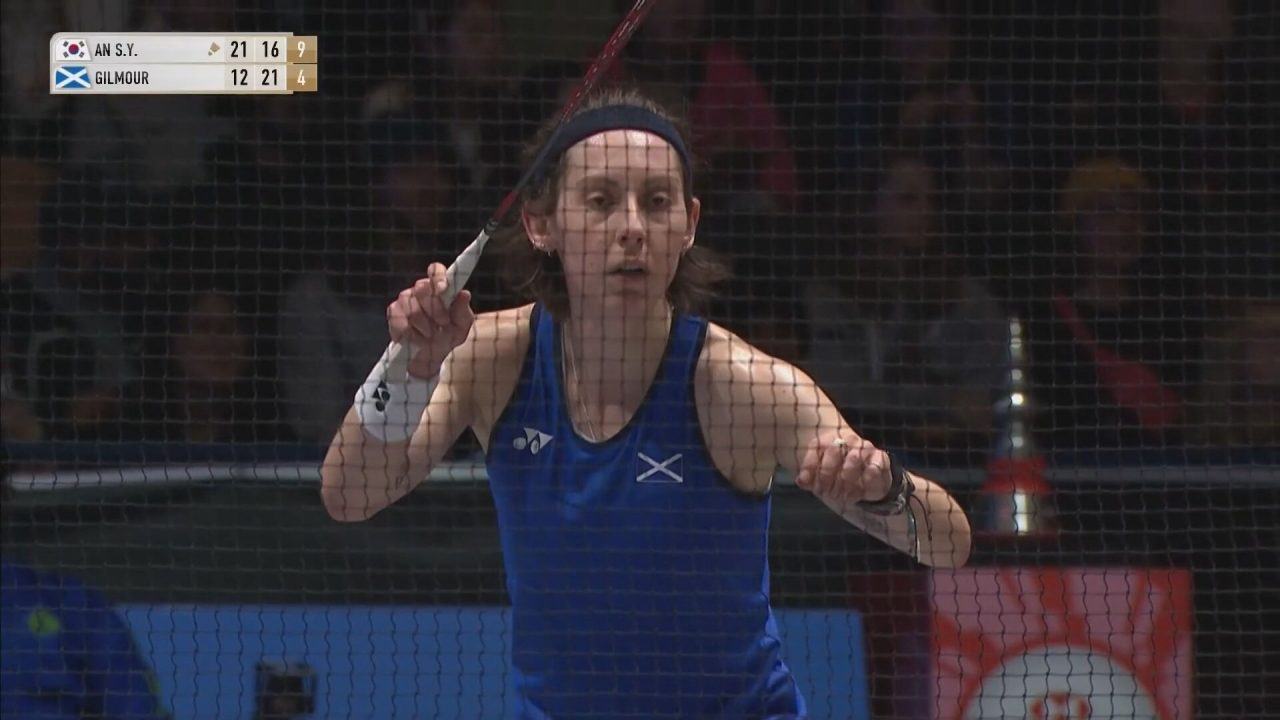World badminton’s governing body has cancelled a yellow card shown to Kirsty Gilmour after she was penalised for leaving the court to deal with her period during a match.
Three-time Olympian Gilmour had called for rule changes after she was disciplined during her women’s singles clash with world number one An Se Young at the YONEX All England Open.
The 31-year-old, from Bellshill in North Lanarkshire, said she had her period a week early and asked the umpire for a bathroom break after winning the second set to “fix the situation”, which she claims was “reluctantly” granted.
On her return to the court, she was then shown a yellow card by the referee for “delaying play” after failing to return within the allotted two minutes.
Gilmour told STV earlier this week that the Badminton World Federation should introduce rules to ensure no other player faces a similar situation while menstruating in future.
The BWF have now rescinded the yellow card but claim that the rules were applied incorrectly by match officials at the time and there is no need for new regulations.
BWF secretary general Thomas Lund said: “The Badminton World Federation (BWF) can confirm details about the on-court incident and yellow card given to Scotland’s Kirsty Gilmour at the YONEX All England Open Badminton Championships 2025.
“The laws of badminton do in fact allow players to leave the field of play for a toilet break at the two-minute interval between games.
“Unfortunately, the umpire did not immediately allow Kirsty Gilmour to leave the court but kept the player on court during the interval while calling the referee.
“When the referee arrived on court and was informed about the situation, he did refer to Law 16.5.2, and Kirsty then left the field of play to go to the toilet at about one minute into the two-minute interval.
“A yellow card was issued by the umpire for delay upon the player’s return to the field of play. Following an official review by the BWF referee team, the yellow card has since been cancelled, as the delay was caused by the umpire not immediately allowing the player to leave the field of play for the toilet break.
“As such, no laws or regulations need to be changed, as per Kirsty’s suggestion in the media. Law 16.5.2 allows for a flexible, common sense application of the regulations to cover a variety of player needs.
“The BWF has an official partnership with Simply Sport Foundation, an Indian-based NGO empowering girls and women within India’s sports ecosystem.
“They have pioneering programme, Simply Periods, which aims to educate athletes and coaches about menstruation and its impact on female athletes’ performance.
“This is a key focus area for BWF as we look to strengthen our inclusion and safeguarding policies within the sport.”
Gilmour welcomed the decision but thinks it can “open up conversations” on the subject.
“Obviously I’m happy with BWFs decision to ‘cancel’ the yellow card and subsequent fine,” she said. “I think there was absolutely no basis to make me pay it.
“So in a personal sense I’m glad this has been resolved but in a wider sense I hope it can perhaps be a catalyst for implementing a new protocol in badminton as well as other sports.
“I also hope that it can open up some conversations on empathy, understanding, and knowledge about the challenges period-having-people face everyday in high performance and recreational sports.”
Speaking to STV before the BWF’s decision to overturn the punishment, Gilmour had called for some “leniency”.
“There’s a protocol if you need to go to the toilet, which is two minutes of the interval break,” she said. “There’s a protocol if there’s a medical issue, (such as) if you cut your knee and there’s blood on the court.
“But in the ‘Venn diagram’ of toilet use and blood issues, there are no rules. They were making it up on the spot. In my view, we went with the wrong decision.
“I would just like there to be a protocol in place to ensure that athletes with periods are treated with some sort of dignity and leniency because it’s such a tough thing to manage while performing at a world-class level at the same time.
“If there’s any pushback about people using it as a tactic to delay the match, I think no person with a uterus wants to stand in front of a few thousand people and tell the umpire with a microphone that they are actively bleeding. Someone will only choose to do that in a real emergency.
“Some sort of leniency needs to be put in place in case this ever happens again.”
Gilmour said she hopes that such incidents do not discourage girls getting into sport.
She added: “There are so many positive changes in women’s sport, such as the introduction of non-mandatory white shorts. It’s those small things that make such a difference.
“Getting women into positions of power and authority in sports organisations, getting young girls and women into sport… Hopefully that’s a good cycle.”
Follow STV News on WhatsApp
Scan the QR code on your mobile device for all the latest news from around the country



 Badminton World Federation Youtube
Badminton World Federation Youtube
























